In an interview with the Financial Times, Grigory Chkhartishvili was asked how his Russian upbringing stimulated his creativity, to which he responded: “I have the impression that if you were born in a calm country you could live until 90 without discovering who you really are because life does not test you so harshly. In my 56 years I have lived five or six lifetimes in Russia.” The challenges Chkhartishvili faced in Russia, then, fostered his artistic abilities, and political opinions, creating a foundation through which he built his career.
Chkhartishvili is today much better known by his pseudonym, Boris Akunin. He was born in Zestaponi, into a Georgian-Jewish family, in the Georgia Soviet Socialist Republic of the USSR in 1956. His Georgian father, Shalva, was an artillery officer in World War I. His mother, Berty, Jewish by nationality, devoted her life to studying and teaching Russian language and literature. Chkhartishvili did not spend much of his childhood in Georgia, as his family relocated to Moscow in 1958.
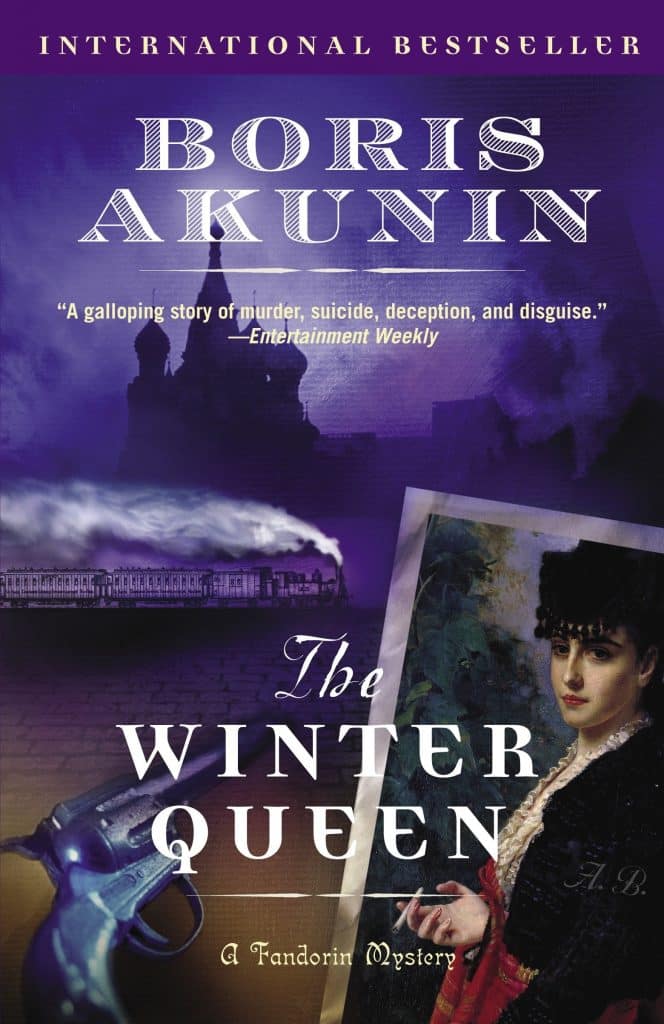
In Moscow, Chkhartishvili attended and graduated from School No. 36 with a comprehensive study of the English language. His ability to learn and understand foreign languages was a talent he had from a young age. After he graduated, Chkhartishvili attended Moscow State University, where he received a degree in History and Philology with a specialization in Asian Studies. Having learned the Japanese language in university, Chkhartishvili spent his time translating literature from Japanese to English. The USSR once had several publications meant for consumption abroad to give greater voice to world literatures in translation.
Early in his career, Chkhartishvili worked multiple jobs that made use of his knowledge of Japanese. His primary position was as a deputy editor-in-chief of the journal Foreign Literature, which was established in 1955 to circulate translated literature. There, Chkhartishvili was best known for his translations of Yukio Mishima, a Japanese author and political dissident. During this time, he was also the editor-in-chief of a 20 volume series entitled Anthology of Japanese Literature.
After the fall of the USSR, while still maintaining his other posts, Chkhartishvili became a chairman of the Pushkin Library Megaproject, which sought to provide a distribution and supply system to libraries in the former USSR after the state supply system collapsed with the Soviet Union. The project was partly funded by activist and billionaire George Soros and thus helped to connect Chkhartishvili with western liberal ideas and institutions.
In 1998, Chkhartishvili shifted his career from translation to writing original fiction and he adopted the pen name B. Akunin. Chkhartishvili’s pen name has two hidden meanings. Firstly, the name refers to the Japanese word “aku-nin,” which means “fiend” or “villain.” Secondly, the name also alludes to Mikhail Bakunin, a well-known 19th century Russian anarchist and political philosopher. This double meaning reveals Chkhartishvili’s playful use of language and keen interest in politics. After his books became bestsellers, he changed the B. to Boris, giving it a more distinctly Russian feel.
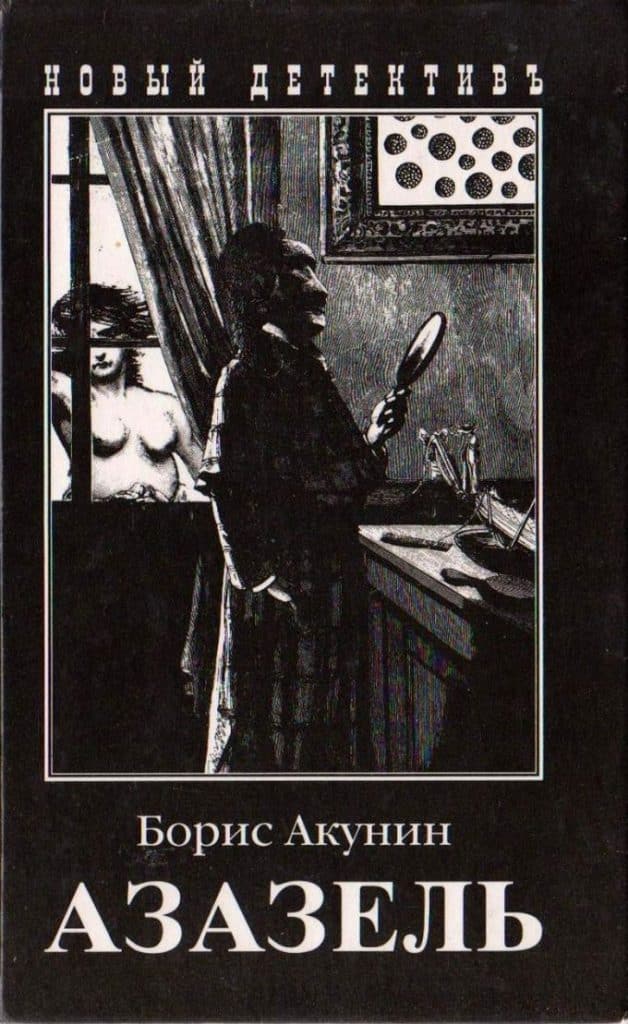
Chkhartishvili released his first novel, The Winter Queen, in 1998. This novel was the first of the Fandorin detective series. It is set in 1876 in Moscow, and follows Erast Fandorin’s investigation of a public suicide that he believes to be a clear case of murder. With the Fandorin series, Chkhartishvili created a character that Russian audiences could respect and like; he was a handsome and polite, as well as smart and resourceful, secret agent who worked in civil service as a clerk in the Criminal Investigations Department of the Moscow Police. Through the Fandorin series, Chkhartishvili transports his readers’ back to Russia’s Golden Age where Tsar Alexander III had absolute power. Initially, The Winter Queen sold only six thousand copies. However, after the fifth book in the series became a best seller by selling over one hundred thousand copies, the series became a sought-after commercial success and developed a nearly cult following. Boris Akunin was suddenly a recognized author in Russia. Today, in Russia alone The Winter Queen has sold 15 million copies.
The series’ success came through its successful appropriation and retooling of an already popular genre. While the detective genre was popular in the Soviet Union, it was considered low-brow. After the collapse of the Soviet Union in 1991, detective novels flooded bookstores, but their reputation remained low as the books continued to feature a great deal of gore and sex. Chkhartishvili’s wife, for instance, enjoyed reading these novels, but was so embarrassed about how she would be perceived if she was spotted with one, that she would cover the books in brown paper while she read them on Moscow’s public transportation. Chkhartishvili set a goal for himself to reclaim the genre, to create something canonical like the works of Tolstoy and Dostoyevsky, while also reinventing common tropes of crime novels. Using historical events as his backdrop, Chkhartishvili filled the gaps of the past with lively stories. The works of Arthur Conan Doyle and Agatha Christie, well-known British detective novel writers, served as an inspiration for Chkhartishvili’s direction, which steered away from gore and sex and towards serious crime-solving mysteries.
In addition to drawing inspiration from western sources, Chkhartishvili’s novels also frequently reference Russian literary traditions. For example, Fandorin’s strong sense of duty to serve the cause rather than the individual, is an allusion to Chatsky, from Alexander Griboyedov’s, Woe from Wit. Chatsky is considered to be an early model of the “superfluous man,” before the term was coined by Turgenev. This Russian literary concept refers to an individual who has strong ideals but does not fit into social norms. Thus, throughout the series, because of his love for his country, Fandorin struggles with disillusionment and does not always fit into the customs of Russian society. In the series, he is often torn between being a loyal servant to his Tsar and a free individual who openly criticizes authority. Parallels, then, can be made between Fandorin and his creator, Chkhartishvili, who expresses love for his homeland and is, at the same time, a vocal member of its liberal opposition.
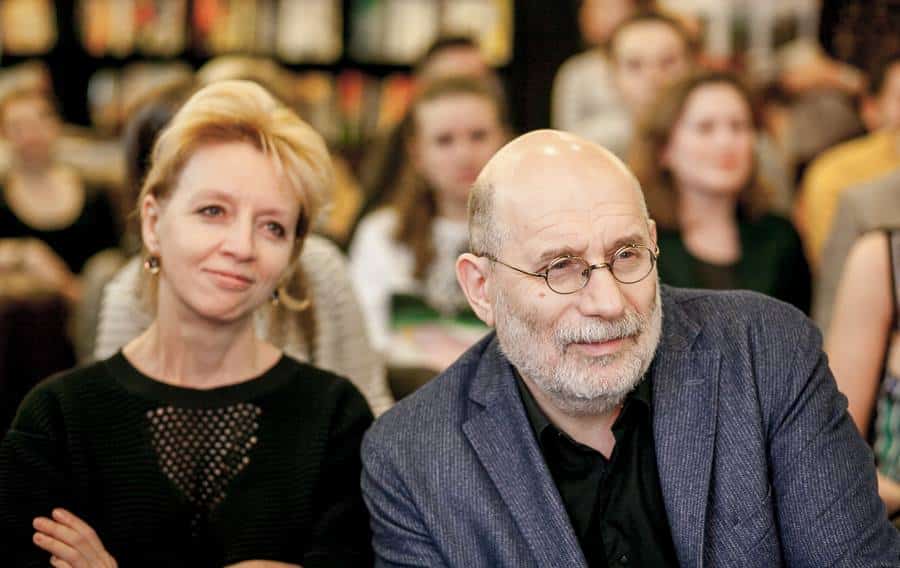
In November 2007, AST, a publishing company linked to Chkhartishvili, released The Ninth Savior by Anatoly Brusnikin. The book was followed by A Hero of a Different Time in 2010 and Bellona in 2012. Despite the fact that these publications were written by an unknown author, AST spent a large amount of money on the advertising campaigns for each book. This resulted in rumors that Brusnikin was actually Chkhartishvili. These rumors were further fueled by the fact that A.O. Brusnikin was an exact anagram of Boris Akunin. The books’ association with the bestselling author, and widespread advertising, helped The Ninth Savior sell more than half a million copies. A Hero of a Different Time and Bellona followed suit, selling 120 thousand copies and 70 thousand copies, respectively. After the release of the third novel, Chkhartishvili admitted in a blog post that he wrote all three novels.
Chkhartishvili’s reason for using another pen name was to experiment with his literature. He wanted to explore the Slavophile point of view and distance himself from his distinctive Western perspective. Historically, Westernizers believe that Russia should use the West as a model for its development whereas Slavophiles oppose Western influences in Russia. Furthermore, Slavophiles believe that Russia should follow its own course, one that is rooted in the country’s rich Slavic history. Chkhartishvili’s The Ninth Savior follows this line of thought and is inspired by Slavic folktales. The novel depicts the lives of the famous three bogatyrs – Ilya Muromets, Dmitry Nikitin, and Alyosha Popov. It expresses anti-Western, and in particular anti-Petrine thought (Peter the Great’s reforms paved the way for further Westernization of Russia). This deviation from Chkhartishvili’s prior Westernizer point of view was met with mixed reception, as reviewers thought the plot was highly derivative and did not add enough new insight into old Russian characters. Reviewers, then, deemed Chkhartishvili’s exploration of the Slavophile perspective as “superficial,” rather than an immersive examination of the intellectual movement.
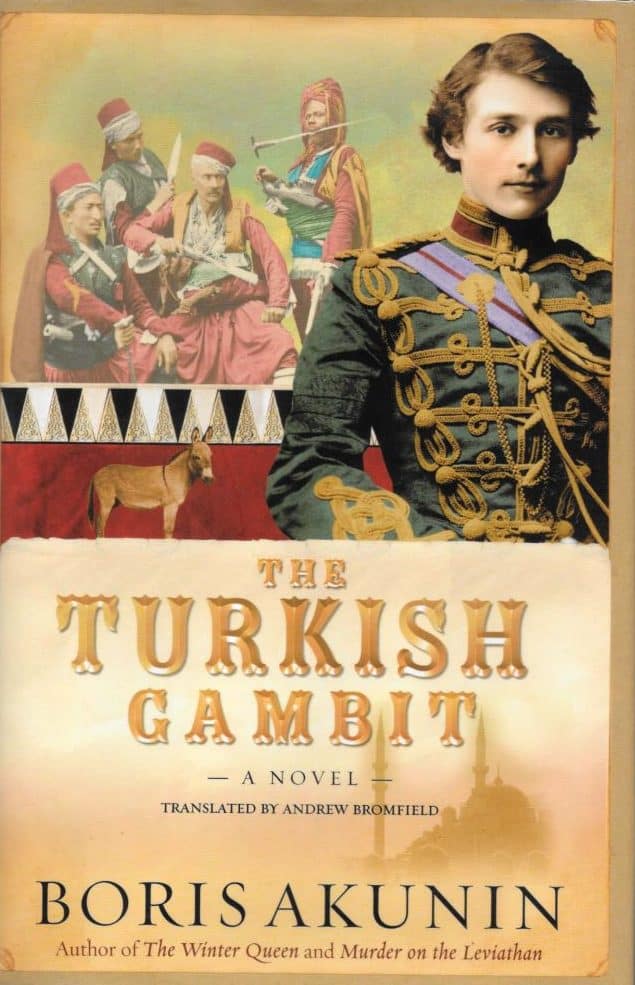
While his works as Brusnikin were generally fruitful, Chkhartishvili’s novels under the name Anna Borisova were economic failures. Russian culture uses patronymics, a sort of middle name specifically derived from the father’s name. Thus, Anna’s surname is a patronymic of Boris, Chkhartishvili’s pen name. She hit bookstores undetected. Borisova’s first book There was released in 2007 and was followed by The Idea Man in 2009 and The Seasons in 2011. Initially, each book sold under ten thousand copies each. In 2011, however, Chkhartishvili admitted he was Borisova which slightly improved the number of copies sold. In the same year he was named the second best-selling author in Russia with 96 699 copies of his books sold in 2011 alone, under his three pen names.
The novels written under the name Anna Borisova were a way for Chkhartishvili to conduct further literary experimentation, as he wanted to delve into philosophical concepts in his new literature. The novel There, for example, takes place in a Moscow airport after a terrorist attack, analyzing different versions of the afterlife depending on the victims’ beliefs. The novel was largely met with poor reception, as reviewers felt it read more as a manifest of differing beliefs and ideologies rather than a work of original fiction. Borisova’s poor sales did not damper Chkhartishvili’s spirit, as he has said the reasons for writing under his various pen names were “anything but economic.” Instead, his pen names were a way for him to attempt writing different genres and separate himself from the Fandorin series.
Despite wanting to separate himself from his series, Chkhartishvili continued writing the Fandorin novels through this experimentation. Only in 2013 did he announce that the Fandorin series would end after 16 installments. He then once again took on a new challenge and began a nine volume history of the pre-revolutionary Russian State. Chkhartishvili’s previous works in fiction initially served as a useful distraction for audiences looking for an escape from the economic and political collapse of the Soviet Union. His turn to history, then, is self-reflexive, critical, and deeply conscious of the economics and politics in Russia’s development. This project has perhaps drawn the most criticism of his efforts – the term “folk history” is often used by his critics to describe the works to set them apart from more scholarly histories and he is often accused of making history fit an ideological perspective or preconceived narrative.
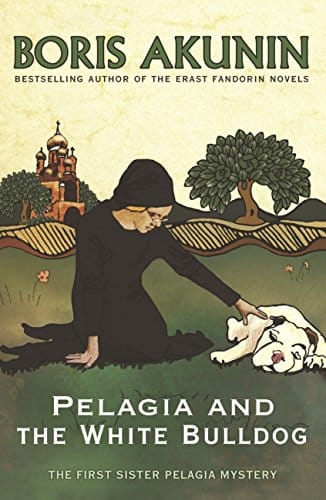
Chkhartishvili, however, is deliberately playing with the genre of the typical history: each volume is accompanied by a fictional story set in the same time period as the volume. The books are also published still under his “Akunin” penname – one known more for fictional detective stories rather than serious scholarly work. Chkhartishvili’s distinct style has proved to be profitable, as readers in Russia have purchased over one hundred eighty thousand copies of the first volume since it was released in 2013. Today, the entire series has sold over seven hundred thousand copies in total.
Apart from his writing, Chkhartishvili has been an active member of Russia’s liberal opposition and participated in the 2011-2012 protests. During the 2011 Duma elections, volunteer citizen-observers, mostly young, middle-class Russians, used cellphones to document and publish election infractions in real time. The result was a mobilization of Russian civil society on a scale not seen since 1991. On December 10, 2011, in a rally in Bolotnaya Square, the first major rally of the season, Chkhartishvili spoke against government corruption in front of a diverse crowd of some 30,000-50,000 protesters. Other speakers that day called for freedom for political prisoners, transparent elections and government, as well as free and unfettered elections. After the successful turnout at the rally, Chkhartishvili helped organize another anti-government protest that took place on December 24. This event was attended by a similar number of Russians as the first, despite subzero temperatures. Chkhartishvili helped capitalize on the success of these turnouts, becoming a founding member of the League of Voters, a socio-political organization, which monitors voting rights in Russia.
In 2012, Chkhartishvili had the idea to hold a “writers’ walk” the day before Putin was inaugurated for his third term. The idea was inspired by demonstrations held that day in Moscow, at which police violently arrested protesters. Chkhartishvili publicly stated that he felt that government oppression was at an all-time high and decided to hold an experiment to, as he put it, see how much freedom Muscovites had left to gather as groups. His public “stroll” would bring writers together with the public to walk between statues of poets in Moscow.
Chkhartishvili contacted fellow authors, Dmitry Bykov and Lyudmilla Ulitskaya, who are also like-minded activists, and advertised his proposed “stroll” on his blog. On May 13, 2012 the writers’ walk was attended by thousands of supporters. Despite his and other’s continued efforts, little tangible change was achieved by the protests and their popularity eventually waned.
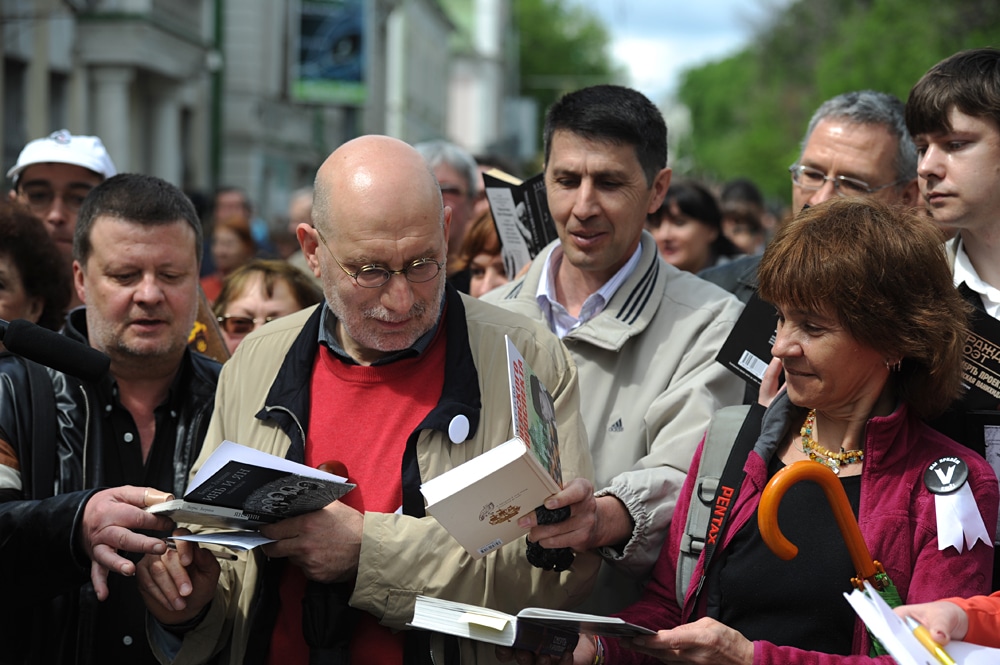
In 2014, after news of Russia’s internationally controversial annexation of Crimea left him feeling “confused and disgusted,” Chkhartishvili left Russia and moved to France. Although he says that his “heart remains with his homeland,” he does not agree with recent decisions made by government, and will not return until changes are made, putting him again in the shoes of the “superfluous individual” of his novels.
Chkhartishvili’s legacy in Russia is evident, as both his novels, and political activism, have left a lasting impression on Russia. The popularity of Chkhartishvili’s Fandorin series has made him the record holder for the most adaptations of a contemporary Russian author. The series has inspired five film adaptations and one television series based on his works, with other projects in development. A production company in England has also reportedly purchased the rights to develop a series in English based on his novels. In terms of numbers, he has written over 50 novels and has sold approximately 30 million copies of his books in over 30 different languages. Furthermore, in Russian politics, like with his literature, he is known not by his given name but by his pen name, or in this case nom de guerre (name of war), which are often used by soldiers and revolutionaries. His speeches and blog posts have contributed to motivating significant numbers of people who have protested against government corruption in Russia and considerably contributed to political thought about Russia both domestically and internationally. Although Chkhartishvili now resides outside of Russia, with no plans to return, he continues to write in Russian, as he says he would consider it “a betrayal” of his heritage to write in any other language.
Boris Akunin interviewed in Krakow, Poland on his writing and on the place of writers in modern Russian civil society.
In Russian, with English subtitles.







